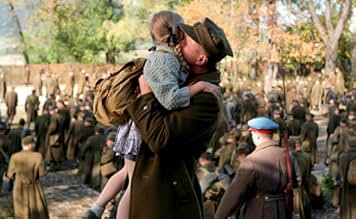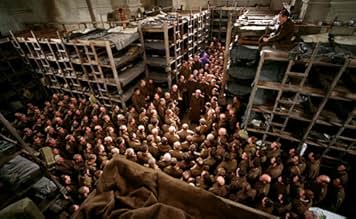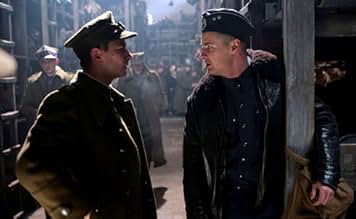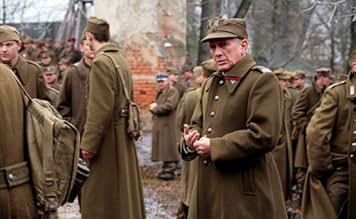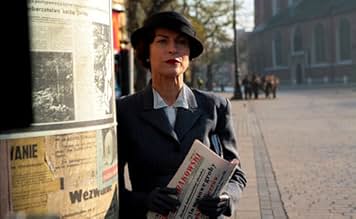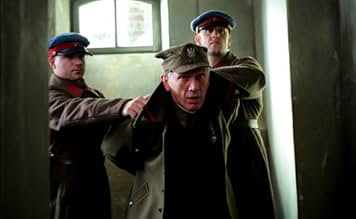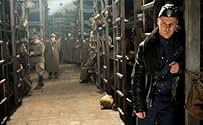IMDb-BEWERTUNG
7,0/10
17.914
IHRE BEWERTUNG
Eine Untersuchung der sowjetischen Schlachtung von Tausenden polnischen Offizieren und Bürgern im Katyn-Wald im Jahr 1940.Eine Untersuchung der sowjetischen Schlachtung von Tausenden polnischen Offizieren und Bürgern im Katyn-Wald im Jahr 1940.Eine Untersuchung der sowjetischen Schlachtung von Tausenden polnischen Offizieren und Bürgern im Katyn-Wald im Jahr 1940.
- Für 1 Oscar nominiert
- 14 Gewinne & 14 Nominierungen insgesamt
Joachim Paul Assböck
- Obersturmbannführer Bruno Müller
- (as Joachim Assböck)
Empfohlene Bewertungen
FILE THIS ONE UNDER.... "TRUTH IS OFTEN STRANGER THEN FICTION"!
BUT BEFORE DIVING IN: Let us FOCUS on the Title's Content & Context!
KATYN makes it painfully clear that the truth was a very scarce commodity throughout decades of Soviet domination.
Considering Katyn was released nearly 20 years after the end of the Communist/Soviet era in Poland. It seems, to me at least, somewhat baffling that it took Polish film-makers so long to share these tragic and poignant true events with the world. In historical retrospect, Nazi atrocities perpetrated against Poland and its people have been well circulated and repeated tirelessly over past decades.
On the other hand, there has been a virtual dearth of information regarding Soviet atrocities. "WWII was triggered by the German blitzkrieg invasion of Poland in September, 1939." is what we Americans have been told ad nauseam for decades. What is rarely ever mentioned is the simultaneous eastern invasion of Poland by Soviet forces! While Nazi aberrations such as Auschwitz and the Warsaw ghetto have been chronicled in numerous well-known films, this marks the first time, in my recollection at least, that Soviet war crimes have been dealt with openly and clearly in a movie.
KATYN relates this true war time story through the interwoven lives of a dozen or so family members and friends. Within minutes of viewing, I was totally gripped by the story, and even though the eventual outcome is a historical fact we are all keenly aware of, the story unfolded in such a way as to never lose my interest.
ENJOY! / DISFRUTELA!
BUT BEFORE DIVING IN: Let us FOCUS on the Title's Content & Context!
KATYN makes it painfully clear that the truth was a very scarce commodity throughout decades of Soviet domination.
Considering Katyn was released nearly 20 years after the end of the Communist/Soviet era in Poland. It seems, to me at least, somewhat baffling that it took Polish film-makers so long to share these tragic and poignant true events with the world. In historical retrospect, Nazi atrocities perpetrated against Poland and its people have been well circulated and repeated tirelessly over past decades.
On the other hand, there has been a virtual dearth of information regarding Soviet atrocities. "WWII was triggered by the German blitzkrieg invasion of Poland in September, 1939." is what we Americans have been told ad nauseam for decades. What is rarely ever mentioned is the simultaneous eastern invasion of Poland by Soviet forces! While Nazi aberrations such as Auschwitz and the Warsaw ghetto have been chronicled in numerous well-known films, this marks the first time, in my recollection at least, that Soviet war crimes have been dealt with openly and clearly in a movie.
KATYN relates this true war time story through the interwoven lives of a dozen or so family members and friends. Within minutes of viewing, I was totally gripped by the story, and even though the eventual outcome is a historical fact we are all keenly aware of, the story unfolded in such a way as to never lose my interest.
ENJOY! / DISFRUTELA!
This excellent movie is a vivid portrayal about war. War has rarely been rendered in such an horrid, utterly grim manner, especially in its final part. Harrowing, unnerving epic which depicts the horror of war as a woman named Anna (Maja) roams the Russian detachments to find his prisoner husband (Arthur Zmijewski) during invasion and other stories. As Anna , her daughter and mother-in-law live in hopes which the father has survived . As a general's (Jan Eglert) wife keeps silence when a Russian officer obligate her to accuse the Germans of her husband's death. Furthermore the Anna's nephew whose father was killed at Katynn is pursued by Russian military for defacing an advertisement cartel . The story contains some overwhelming sequences as the massacre across the Katyn wood and including some actual documentary. It packs a sensible and spectacular musical score by the classic musician Krzystof Penderecki. Evocative and colorful cinematography by Pawel Edelman, usual of Roman Polanki and Wadja. The motion picture has splendidly been directed by the veteran Andrzej Wadja, the best Polish director who made classics as ¨Pan Tadeusz, Danton, The promised land, Kanal¨ among others.
The historic events in which this movie are based result to be the following : Hitler wanted to avoid facing a possible alliance of the Soviet Union , Britain and France. The Western democracies were equally aware of the Soviets' potential to deter German expansion but their negotiations with Stalin did not lead to any agreement. At the same time, however, Hitler had set aside his ideological differences with Stalin in the hopes of making an alliance. In August 1939 he offered Stalin a deal : If the Soviets allowed Germany to attack Western Poland , they would receive eastern Poland and Baltic states. The Munich capitulation of France and Britain to Hitler's demands convinced that they would be unreliable allies . He decided that he had to cope with German expansion eastward on his own, without their help. In late August 1939, German foreign Secretary Joachin Von Ribentropp visited Moscow to sign with Molotov a German-Soviet Nonagression Pact , which included the deal over territory. The agreement between two nations at opposite political extremes, fascism on one side , communism on the other, shocked the world. It also left Hitler with a free hand in Poland. Hitler used an apparent Polish raid on a Radio Station in the German border town of Gleiwitz as an excuse to invade Poland the following day , September 1, 1939. Two days later, on September 3, France and Britain declared war on Germany, WWII had begun. Beaten back by the Germans, Polish forces were now attacked from the east. The Soviet dictator Joseph Stalin ordered his Red Army to cross into eastern Poland. He claimed that he wanted to prevent anarchy caused by the collapse of Polish government. Thousands of Soviet troops poured across the border and raced west to link up with German troops. Organized Polish resistance to the invaders collapsed. In the last week of September Polish troops in Modlin and Warsaw surrounded to the Germans, A small garrison of 4.500 men held out on the Hel Peninsula near Danzing until October 2. Some 694.000 Polish were seized by the victorious Germans and more than 217.000 Poles were rounded up by the Red Army. Both the Germans and Soviets treated the Poles with great brutality. Stalin ordered most of his prisoners deported to the Gulag (a system brutal labor camps) and later taking more than 20.000 officer prisoners were executed in secret.
The historic events in which this movie are based result to be the following : Hitler wanted to avoid facing a possible alliance of the Soviet Union , Britain and France. The Western democracies were equally aware of the Soviets' potential to deter German expansion but their negotiations with Stalin did not lead to any agreement. At the same time, however, Hitler had set aside his ideological differences with Stalin in the hopes of making an alliance. In August 1939 he offered Stalin a deal : If the Soviets allowed Germany to attack Western Poland , they would receive eastern Poland and Baltic states. The Munich capitulation of France and Britain to Hitler's demands convinced that they would be unreliable allies . He decided that he had to cope with German expansion eastward on his own, without their help. In late August 1939, German foreign Secretary Joachin Von Ribentropp visited Moscow to sign with Molotov a German-Soviet Nonagression Pact , which included the deal over territory. The agreement between two nations at opposite political extremes, fascism on one side , communism on the other, shocked the world. It also left Hitler with a free hand in Poland. Hitler used an apparent Polish raid on a Radio Station in the German border town of Gleiwitz as an excuse to invade Poland the following day , September 1, 1939. Two days later, on September 3, France and Britain declared war on Germany, WWII had begun. Beaten back by the Germans, Polish forces were now attacked from the east. The Soviet dictator Joseph Stalin ordered his Red Army to cross into eastern Poland. He claimed that he wanted to prevent anarchy caused by the collapse of Polish government. Thousands of Soviet troops poured across the border and raced west to link up with German troops. Organized Polish resistance to the invaders collapsed. In the last week of September Polish troops in Modlin and Warsaw surrounded to the Germans, A small garrison of 4.500 men held out on the Hel Peninsula near Danzing until October 2. Some 694.000 Polish were seized by the victorious Germans and more than 217.000 Poles were rounded up by the Red Army. Both the Germans and Soviets treated the Poles with great brutality. Stalin ordered most of his prisoners deported to the Gulag (a system brutal labor camps) and later taking more than 20.000 officer prisoners were executed in secret.
A well done picture speaking for those who cannot speak for themselves and would be gladly considered never existing by some.
Although it's difficult to credibly and adequately convey the horror of such a murder which became a life tragedy for many Polish families and undoubtedly affected the way Poland looked after the war I think the director made a good job. Especially so, that it happened to be his personal tragedy as well.
Despite that the movie is well-balanced with emotions and atmosphere. Modest colors and anxious music by Penderecki emphasize the horror of those who were waiting. Short cuts of brutal scenes of murder leave speechless. No additional comment is needed.
Although it's difficult to credibly and adequately convey the horror of such a murder which became a life tragedy for many Polish families and undoubtedly affected the way Poland looked after the war I think the director made a good job. Especially so, that it happened to be his personal tragedy as well.
Despite that the movie is well-balanced with emotions and atmosphere. Modest colors and anxious music by Penderecki emphasize the horror of those who were waiting. Short cuts of brutal scenes of murder leave speechless. No additional comment is needed.
KATYN is one of the most powerful World War II films I have ever seen and from the first frame of Poles fleeing from the Germans to the rear and the Russians in the front, an audience immediately feels the horror and claustrophobia of attempting to flee from the enemy, but with a sense of absolutely no where to run. The cast is simply superb, the story one of Polish Officers who meet their fate at the hands of the enemy, but with a sense of pride in themselves and their families, and the men and women who struggled to deal with both the Germans and the Russians and survive, is one written in the annals of history, but now with the truth of the slaughter finally brought to light. The final scenes in KATYN sent me from the theater with a sense of wanting to get a deep breath of air in my lungs, and to attempt to digest the horror I had just seen on the screen. KATYN deserves the Oscar and it is a film that will haunt you forever.
Andrzej Wajda is a brave man. He made "The Man of Marble" and " The Man of Iron" a couple of years before the free trade unions started in Poland. Already in these pictures he attacked the communist system.
This is another variable of that theme. Here it is the Katyn massacre, there Polish officers were executed by the Soviets, who blamed all on the Nazis. And the Polish regime agreed upon it.
Wajda's method, in which he is better than almost anyone else, is showing the endless individual suffering behind the so called world history. Which makes this history more than statistics and analysis.
This is no exception.
This is another variable of that theme. Here it is the Katyn massacre, there Polish officers were executed by the Soviets, who blamed all on the Nazis. And the Polish regime agreed upon it.
Wajda's method, in which he is better than almost anyone else, is showing the endless individual suffering behind the so called world history. Which makes this history more than statistics and analysis.
This is no exception.
Wusstest du schon
- WissenswertesThe director's father was killed in this massacre. Andrzej Wajda was only 13 years old then. His father's remains were never found.
- PatzerTur says to Ewa, "Haven't you seen that Disney's "The Sleeping Beauty", remember?" That movie was first released fourteen years after 1945, so this may be a mistranslation in the subtitles for "Snow White".
- VerbindungenFeatured in The 80th Annual Academy Awards (2008)
- SoundtracksPolish Requiem For 4 Solo Voices, Choir And Orchestra
Written by Krzysztof Penderecki
Performed by Polish State Philharmonic Orchestra
Top-Auswahl
Melde dich zum Bewerten an und greife auf die Watchlist für personalisierte Empfehlungen zu.
- How long is Katyn?Powered by Alexa
Details
- Erscheinungsdatum
- Herkunftsland
- Offizieller Standort
- Sprachen
- Auch bekannt als
- Katyn
- Drehorte
- Produktionsfirmen
- Weitere beteiligte Unternehmen bei IMDbPro anzeigen
Box Office
- Budget
- 4.000.000 € (geschätzt)
- Bruttoertrag in den USA und Kanada
- 118.095 $
- Eröffnungswochenende in den USA und in Kanada
- 11.053 $
- 22. Feb. 2009
- Weltweiter Bruttoertrag
- 14.768.451 $
- Laufzeit2 Stunden 2 Minuten
- Farbe
- Sound-Mix
- Seitenverhältnis
- 2.35 : 1
Zu dieser Seite beitragen
Bearbeitung vorschlagen oder fehlenden Inhalt hinzufügen


